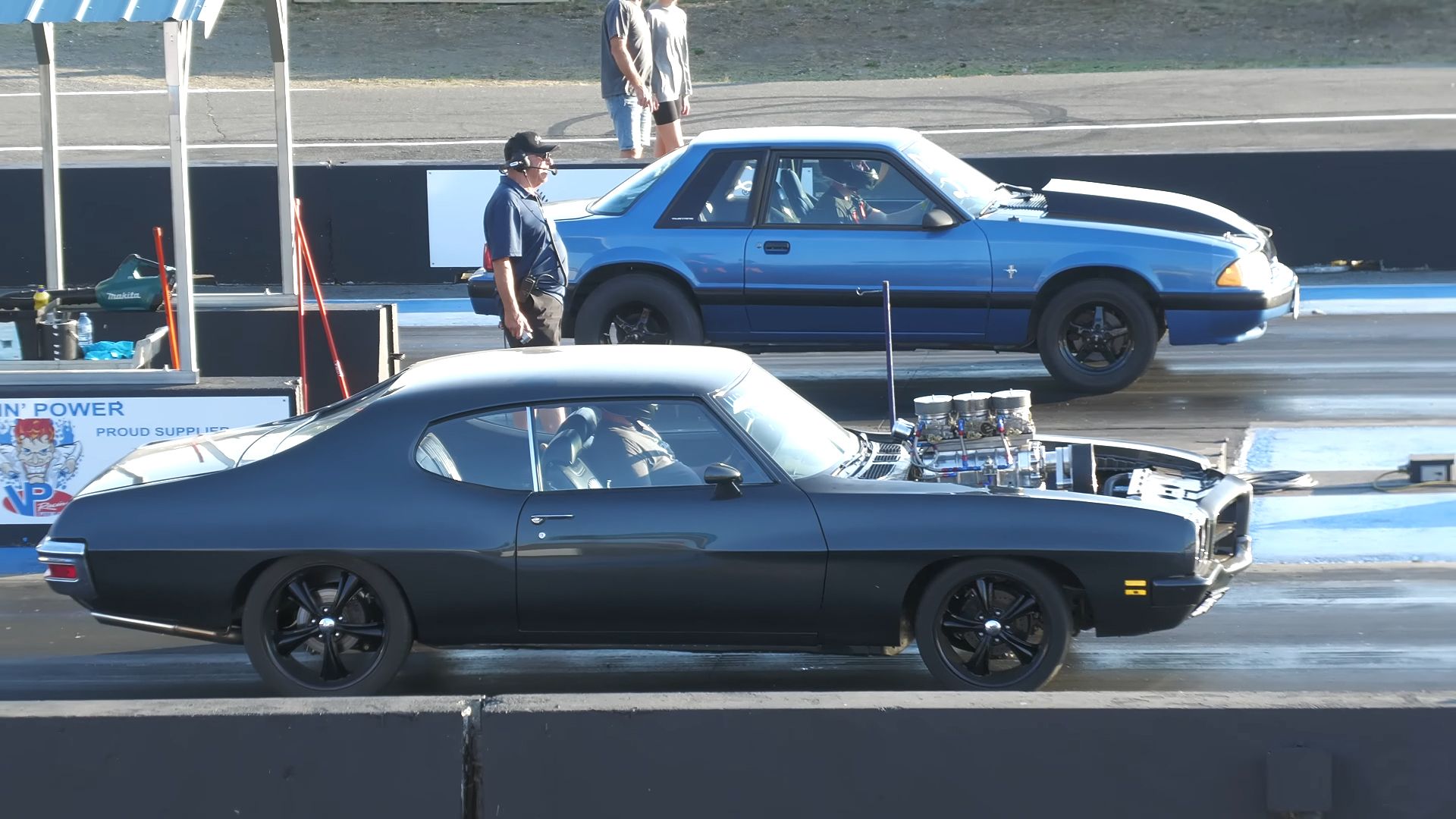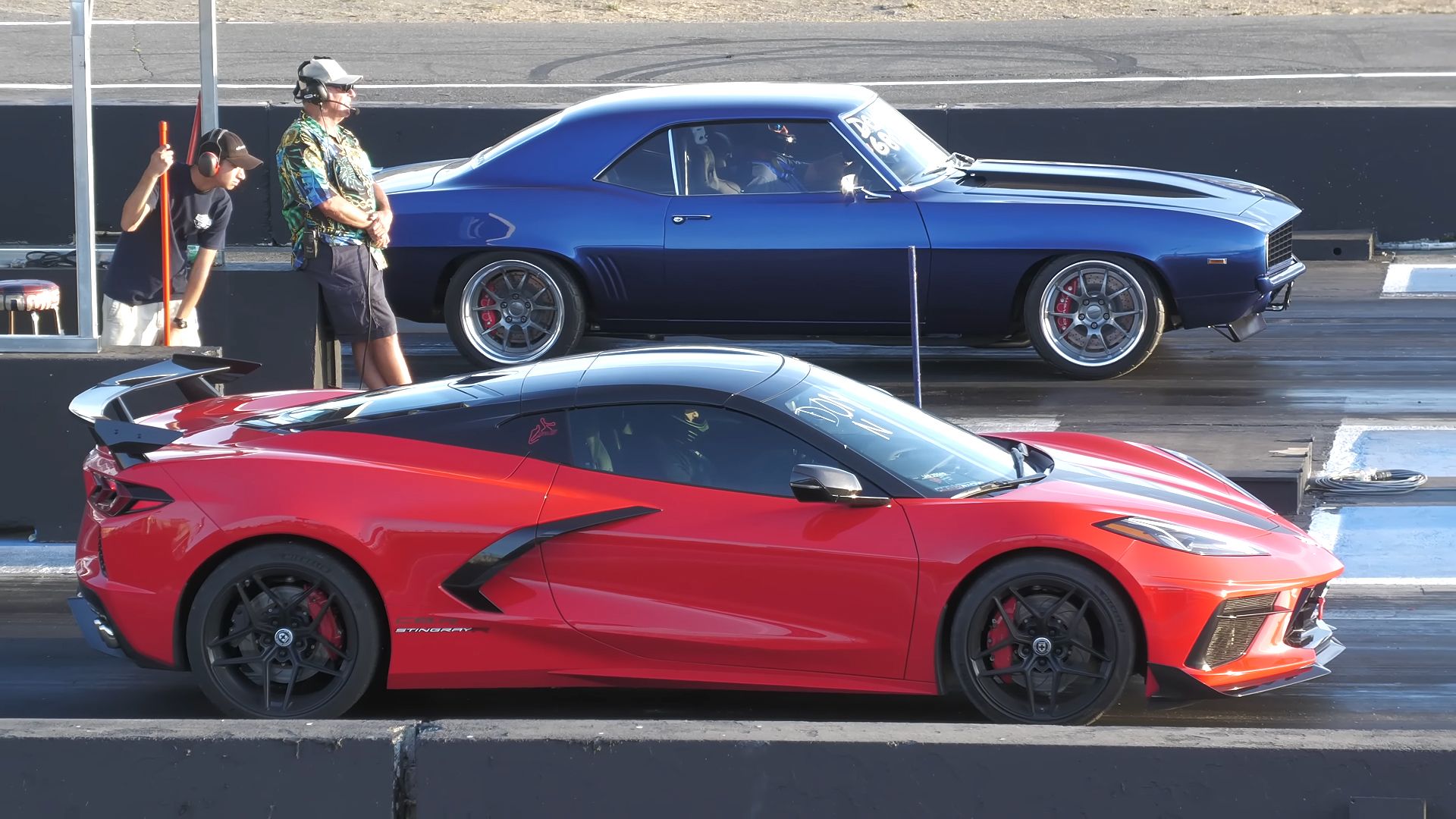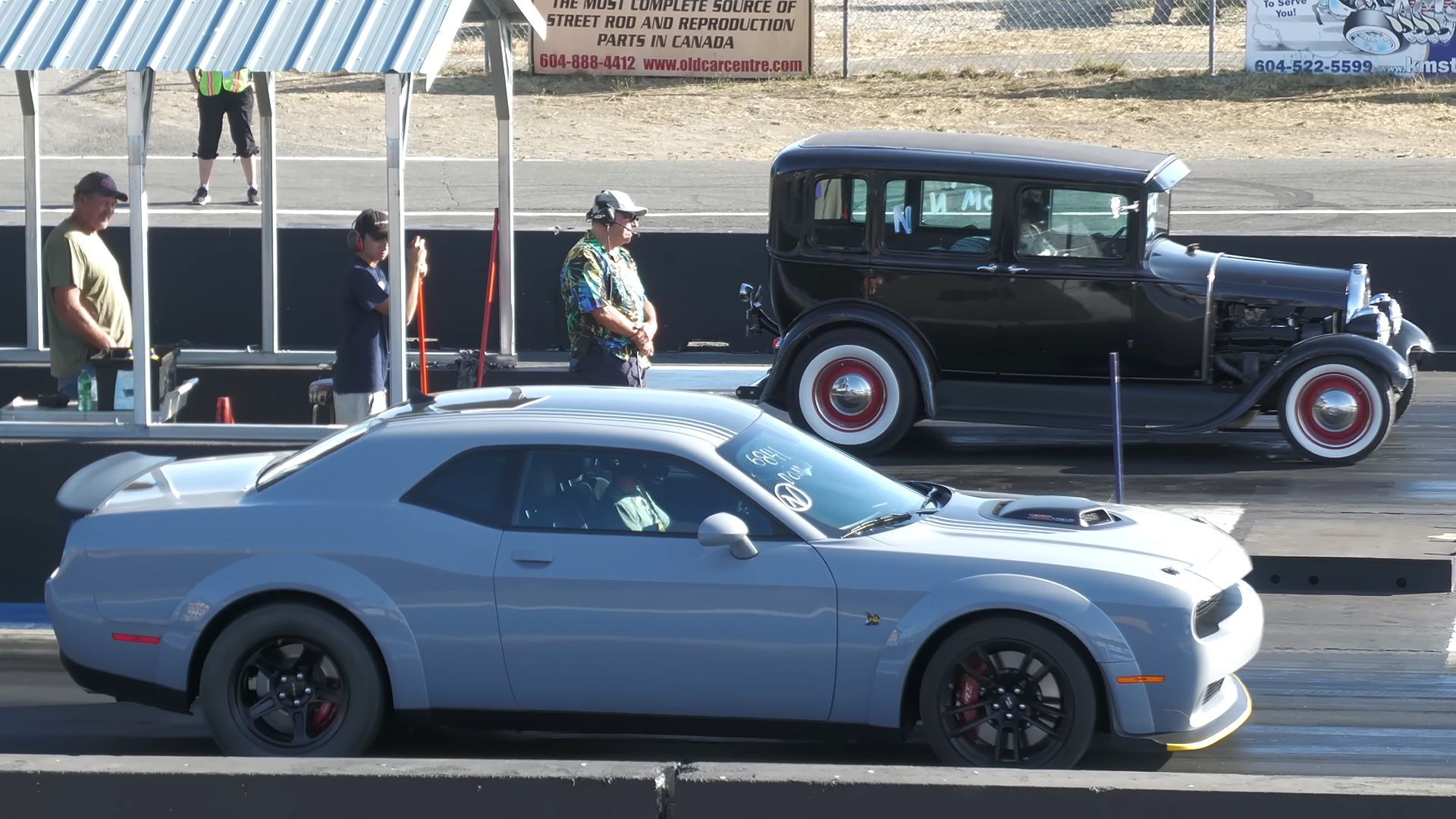Resume
- Classic muscle cars from the 60s and 70s prove that they still have plenty of power and can take on today’s sports cars in drag racing by a narrow margin.
- Modified classic muscle cars with huge turbochargers can beat modern sports cars in drag racing, showing the owners’ dedication to preserving the performance and appearance of these legendary cars.
- The Dodge Hellcat engine continues to dominate the track, effortlessly beating classic cars and even some modern sports cars.
Muscle car Fans will agree that there aren’t many things more exciting than V8 power plants drag racing each other, especially when the old school meets the new sports cars. Perfectly preserved legendary muscle cars from the 60s and 70s go up against modern technology and horsepower, and to be able to dominate some, if not all, is a thrill unlike any other.
YouTube channel Wheels covers one such exciting set of races, featuring some stunning classic muscle cars pitted against their modern counterparts. While many modern cars eventually win races, they do so by a slim margin, as these 50-year-old and even older cars prove they have plenty of life and wit left in them.
Of course, these are not standard classics, many of them have huge blowers sticking out of their hoods. However, owners keep them in such pristine condition that these classic cars look even more attractive than the newer sports cars they compete with. So here’s a little look at what happened in this race between ancient and modern technology.
How do classic Chevy Novas stack up against today’s sports cars?
In the first race, a stunning white 1972 Chevrolet Nova competes against a matte gray 2015 Dodge Challenger SRT. Both cars look great, with the Dodge looking quite menacing against the sleeker Nova. Although this classic looks modified, the Chevy Nova had quite powerful engines for its time, despite initially debuting as a compact economy car. All Chevy Nova SS models with the 5.3L, 5.7L, 6.5L, and 6.6L engines are muscle cars, rated up to 375 horsepower.
1970 Chevy Nova SS Specs
|
Engine type |
Chevy big-block V8 |
|
Engine capacity |
6.5-liter (396 cu in) |
|
Horsepower |
375 hp |
|
Method of transmission |
Four-speed manual transmission or Turbo Hydramatic |
|
Base price (in 1970) |
2978 USD |
(Technical specifications, unchanged (does not show the car in the video) were taken from official GM site.)
So how did the Nova stack up against the Challenger? Even though the Modern Sport won this round, it was a bit of a close match with the Nova taking off like a rocket before the Challenger caught up with it’s racing performance.
|
Model |
2015 Dodge Challenger SRT |
1972 Chevrolet Nova |
|
A quarter of a mile |
9:88 seconds |
11.17 seconds |
|
The highest speed |
142.36 miles per hour |
113.58 mph |
When the purple 2019 Dodge Challenger Hellcat Redeye went head-to-head with the stunning black 1973 Chevy Nova SS, the results were stunning considering the Nova beat the Hellcat Redeye in every way. The old school Chevy Nova handles the Challenger Redeye with ease.
|
Model |
2019 Dodge Challenger Hellcat Redeye |
1973 Chevrolet Nova SS |
|
A quarter of a mile |
11.90 seconds |
10.45 seconds |
|
The highest speed |
123.73 miles per hour |
127.95 mph |
Another Nova, this time a slightly battered version of the Chevy Nova II, took on another stunning old-school classic, the 1969 Camaro Z28. Even though it was an old-school battle, given that the Chevy Nova II also debuted in 1962 and lasted through five generations, it was interesting to see the Camaro emerge as the muscle car winner.
|
Model |
Chevy Nova II |
1969 Chevy Camaro Z28 |
|
A quarter of a mile |
11:98 seconds |
10:58 seconds |
|
The highest speed |
113.21 mph |
135.36 mph |
The Pontiac GTO continues to compete with its contemporaries
Unlike Chevy Novas, whose owners were happy to take on modern sports cars in the form of the Dodge Challenger, it looks like the racers on these Pontiac GTO rims decided to stick with their competition. In the history of the classic Pontiac GTO, the most powerful models were the 1969-70 Ram Air IV 400 CID V8 engine that produced 370 horsepower and 445 lb-ft of torque. according to the Muscle Car Club.
The first Pontiac GTO we see in this race is hoodless and has a huge supercharger, so it’s clear that there’s nothing standard about this classic. Then again, even the 1989 Fox-Body Mustang has a big nose on the hood, almost like a Ram III Air Intake shaker, so both of these awesome classics have extra power. Even though the Pontiac GTO was known for its amazing power, this time it was the Mustang that won.
|
Model |
1989 Ford Mustang |
1969-1970 Pontiac GTO |
|
A quarter of a mile |
12:15 seconds |
12:44 seconds |
|
The highest speed |
112.98 mph |
104.65 mph |
However, that changed when another GTO, this time with a supercharger the size of Texas, took on the Chevy Camaro SS and won by a wide margin. The Camaro’s time can be credited to driver error or some type of malfunction.
|
Model |
Pontiac GTO |
Chevrolet Camaro SS |
|
A quarter of a mile |
14:68 seconds |
17:16 seconds |
|
The highest speed |
100.02 miles per hour |
63.97 miles per hour |
Modern Chevy Corvette racing has had mixed results
There were also two Chevy Corvettes on the track, with the first race pitting America’s favorite sports car against the old school classic 1969 Chevrolet Camaro. Not only did the C8 Corvette look much more powerful than the classic muscle car, even though the 1969 Camaro was a product of the war at the peak of power, but it also beat the old school muscle cars squarely.
|
Model |
1969 Chevrolet Camaro |
C8 Chevrolet Corvette |
|
A quarter of a mile |
12.61 seconds |
11.59 seconds |
|
The highest speed |
117.46 miles per hour |
113.92 miles per hour |
Still, a supercharged Plymouth HEMI ‘Cuda took the race from a white C7 Corvette, proving that muscle cars are just as good as modern sports cars, even if the C7 is a few years old. Muscle car enthusiasts will agree that there is something special about the Plymouth Hemi ‘Cuda, and various iterations of this engine are used to power current Dodge Chargers and Challengers.
|
Model |
Plymouth HEMI Cuda |
Chevrolet C7 Corvette |
|
A quarter of a mile |
9.41 seconds |
10.41 seconds |
|
The highest speed |
145.30 mph |
139.84 mph |
1971 Plymouth HEMI ‘Cuda Specifications
|
Engine type |
HEMI V8 |
|
Engine capacity |
6.98 liters (426 cu in) |
|
Horsepower |
425 hp |
|
A turning point |
490 lb-ft |
|
Method of transmission |
Four-speed mechanics |
Technical specifications, unchanged (do not show the car in the video) were taken from official website of Stellantis Media.
The Hellcat engine is alive and well on the drag strip
So, we know that the Hellcat takes on the latest challenge when it comes to Dodge’s long-standing and iconic sports cars like the Charger and Challenger. Along with those legendary nameplates, the Ram TRX is also retiring the Hellcat by the end of 2023, though the engine will last longer in the Dodge Durango SRT.
However, on the track, it seems that the Dodge Hellcat engine is not only alive and well. It also successfully competes and beats classic cars without even trying too hard. In one race, a Dodge Hellcat Charger SRT competes against a 1971 Plymouth Duster whose flame decals make it look fast, but it’s more an illusion than a reality.
|
Model |
Dodge Charger Hellcat |
1971 Plymouth Duster |
|
A quarter of a mile |
11.62 seconds |
13.03 seconds |
|
The highest speed |
113.18 mph |
109.52 mph |
Another race that caught the attention of fans was between one old, old classic, the Ford Model A, which went up against the 2019 Dodge Challenger SRT Hellcat with predictable results, given that the Challenger won by a huge margin, although we doubt the driver this Challenger car tried very hard.
|
Model |
Ford Model A |
2019 Dodge Challenger SRT Hellcat |
|
A quarter of a mile |
14.33 seconds |
12.27 seconds |
|
The highest speed |
91.965 mph |
109.17 mph |
This particular drag race video ended with a fantastic 1957 Chevy Bel Air racing a beautiful olive green 2019 Dodge Challenger Hellcat SRT, and once again the Challenger rose to the challenge. With that in mind, all these drag races prove that it’s important not to be new or old: it all depends on what’s under the hood and who’s behind the wheel.
|
Model |
1957 Chevrolet Bel Air |
2019 Challenger Hellcat SRT |
|
A quarter of a mile |
13.87 seconds |
12.03 seconds |
|
The highest speed |
95.88 mph |
113.90 mph |
Source: YouTube channel Wheels, GM, Stellantis, Muscle Car Club


